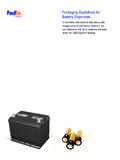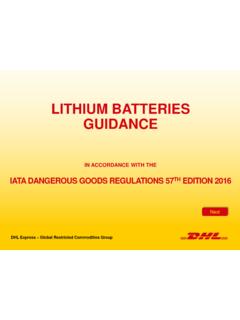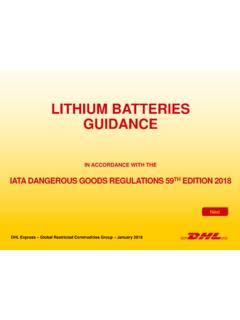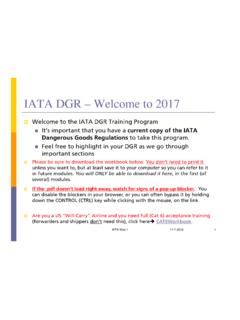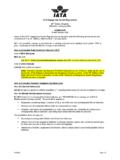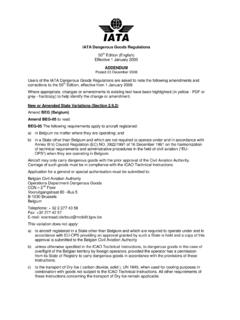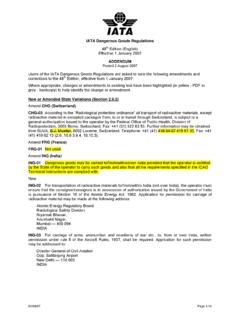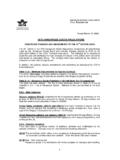Transcription of IATA Dangerous Goods Regulations ADDENDUM 2 …
1 04/05/15 Page 1/15 iata Dangerous Goods Regulations 56th Edition (English) Effective 1 January 2015 ADDENDUM 2 Posted 4 May 2015 Users of the iata Dangerous Goods Regulations are asked to note the following amendments and corrections to the 56th Edition, effective from 1 January 2015. Where appropriate, changes or amendments to existing text have been highlighted (in yellow - PDF or grey - hardcopy) to help identify the change or amendment. New or Amended State Variations (Section ) Amend PLG (Poland) PLG-01 Transport of Consignments containing spent nuclear fuel or radioactive waste, transported to, from, through orand over the territory of Poland will not be accepted without permission by the President of the Civil Aviation Office (CAO) after consultation with the President of the National Atomic Energy Agency. Every correspondence should be sent to the President of the CAO no later than thirty working days before planned flight.
2 The applications should be sent to: are subject to prior written notification. Notification should be forwarded at least two weeks prior to shipment to: President of Civil Aviation Office 2 Flisa Street 02-247 Warsaw POLAND National Atomic Energy Agency (PAA) Department of Radiological Protection Krucza 36 Street 00-522 Warsaw Telephone No: +48 22 695 97 43 Fax No: +48 22 695 98 71 E-mail: Amend USG (United States) USG-02 In addition to the Dangerous Goods included in Subsection (List of Dangerous Goods ) with the word Forbidden shown in columns G/H, I/J and K/L and with no A1 or A2 Special Provision indicated, any material forbidden for transport by the United States' Regulations is also forbidden for transport under any circumstances to, from or within the United States (see 49 CFR and the Hazardous Materials Table in 49 CFR ). Unless specifically authorized by the Hazardous Material Table in 49 CFR , the transport of a liquid with a vapour inhalation toxicity meeting the criteria of Division , Packing Group I or a gas meeting the criteria of Division is forbidden for transport aboard passenger and cargo aircraft to, from or within the United States.
3 Primary (non-rechargeable) lithium metal batteries and cells, (UN 3090), are forbidden for transportation aboard passenger-carrying aircraft. Such batteries transported in accordance with Section II of Packing Instruction 968 must be marked PRIMARY LITHIUM BATTERIES FORBIDDEN FOR TRANSPORT ABOARD PASSENGER AIRCRAFT or LITHIUM METAL BATTERIES FORBIDDEN FOR TRANSPORT ABOARD PASSENGER AIRCRAFT in addition to the CARGO AIRCRAFT ONLY label required by these Regulations . Primary (non-rechargeable) lithium metal batteries and cells contained in or packed with equipment (UN 3091) are forbidden for transportation aboard passenger-carrying aircraft unless: iata Dangerous Goods Regulations 56th edition (English) Effective 1 January 2015 ADDENDUM 2 04/05/15 Page 2/15 1. the equipment and the batteries and cells are transported in accordance with Packing Instruction 969 or 970, as appropriate; 2.
4 The package contains no more than the number of lithium metal batteries or cells necessary to power the intended piece of equipment; 3. the lithium content of each cell, when fully charged, is not more than 5 g; 4. the aggregate lithium content of the anode of each battery, when fully charged, is not more than 25 g; and 5. the net weight of lithium batteries does not exceed 5 kg (11 lb). Primary (non-rechargeable) lithium metal batteries and cells contained in or packed with equipment (UN 3091) and transported in accordance with Section I of Packing Instruction 969 or 970 that do not conform to the above provisions are forbidden for transportation aboard passenger-carrying aircraft and must be labelled with the CARGO AIRCRAFT ONLY label. Primary (non-rechargeable) lithium metal batteries and cells contained in or packed with equipment (UN 3091) and transported in accordance with Section II of Packing Instruction 969 or 970 that do not conform to the above provisions are forbidden for transportation aboard passenger-carrying aircraft and must be marked PRIMARY LITHIUM BATTERIES FORBIDDEN FOR TRANSPORT ABOARD PASSENGER AIRCRAFT or LITHIUM METAL BATTERIES FORBIDDEN FOR TRANSPORT ABOARD PASSENGER AIRCRAFT.
5 Notes: 1. Dangerous Goods that are forbidden on passenger aircraft by 49 CFR (Column 9A) are also forbidden on passenger aircraft even when these Regulations permit such carriage. Dangerous Goods that are forbidden on cargo aircraft by 49 CFR (Column 9B) are also forbidden on cargo aircraft even when these Regulations permit such carriage. 2. Dangerous Goods not permitted for carriage by passengers or crew in checked or carry-on baggage by 49 CFR are not permitted for such carriage even when authorized by of these Regulations . For example, the carriage of avalanche rescue backpacks by passenger or crew (see ) is not authorized. USG-03 The following provisions apply to substances listed in Subsection List of Dangerous Goods : (a) where A1 appears in Column M, the substance may not be transported to, from, or within the United States aboard a passenger aircraft without the prior approval of the appropriate authority of the US (see USG-01); (b) where A2 appears in Column M, the substance may not be transported to, from, or within the United States aboard a cargo aircraft without the prior approval of the appropriate authority of the US (see USG-01).
6 (c) prototype lithium batteries and cells transported in accordance with special provision A88, lithium cells or batteries including when packed with equipment or contained in equipment transported in accordance with Special Provision A99, and organic peroxides and self-reactive substances that are not identified by technical name in 49 CFR (b) may not be transported to, from, or within the United States aboard a passenger or cargo aircraft without the prior approval of the appropriate authority of the US (see USG-01); (d) where A201 appears in Column M, the lithium metal cells or batteries may not be transported to, from or within the United States aboard a passenger aircraft without the prior approval of the appropriate authority of the (see USG-01). USG-16 Safety devices (including Airair bag inflators, air bag modules and seat belt pretensioners, etc.) may not be transported to, from or within the United States without prior approval by the appropriate national authority of the US (see USG-01), Attention: Approvals and Permits Division (PHH-30).
7 Such approval remains valid for subsequent transport provided there is no change in its composition, design or packaging. For domestic transport, air bag inflators, modules and pretensioners that meet the criteria for a Division explosive must be transported using the description Articles, pyrotechnic for technical purposes UN 0431. The Dangerous Goods transport document (Shipper's Declaration) must contain the EX number or product code for each approved inflator, module or pretensionersafety device in association with the basic description required in If product codes are used they must be traceable to the specific EX number assigned to the inflator, module or pretensioner, as applicable, safety device, the appropriate authority of the US The EX iata Dangerous Goods Regulations 56th edition (English) Effective 1 January 2015 ADDENDUM 2 04/05/15 Page 3/15 number or product code is not required to be marked on the outside package.
8 These requirements do not apply to air bag inflators, air bag modules and seat belt pretensioners safety devices assigned to Class 9 (UN 3268) provided that the provisions of 49 CFR have been met. New or Amended Operator Variations (Section ) In List add: After Air Niugini Air Serbia JU After Iberia Iberia Express I2 After Jet Airways: JetBlue Airways B6 Delete: JAT Airways JU Delete: US Airways US In make the following changes: Amend 5X (United Parcel Service) 5X-03 Dangerous Goods shipments will be accepted in Air Cargo Service by contract only. All contract applications must be reviewed and approved by the UPS Air Dangerous Goods Department (SDF) and Air Cargo Service (UPS Air Group-SDF). Hazard Classes accepted in Air Cargo Service are subject to approval, and shipments are subject to advance arrangement. A contract is required for shipments of UN 3480, Lithium ion batteries, prepared in accordance with Section IB of Packing Instructions 965.
9 Such shipments must be tendered with either: a completed Shipper's Declaration for Dangerous Goods ; or an Air Waybill presenting the information required by Section IB, paragraph (b)(1) through (b)(4) of Packing Instructions 965. UPS Air Cargo Service does not accept shipments of UN 3090, Section IA or IB lithium metal batteries. Refer to 5X-08 for information regarding approval to ship UN 3090 Section II lithium metal batteries. 5X-07 The following limitations apply to the commodities identified here: Depending on required routing, shipments of UN 3090, Lithium metal batteries, including Section II shipments, UN 3480, Lithium ion batteries prepared in accordance with Section II of PI 965 may need to be returned to shippers due to prohibitions on carrying such shipments aboard passenger aircraft additional restrictions imposed by aircraft operators which may limit UPS s ability to provide service to and from some origins and destinations.
10 Shipments of refurbished lithium batteries, or refurbished lithium batteries packed with or contained in equipment are not accepted unless specifically approved by the UPS Air Dangerous Goods Department (SDF); Shipments of lithium batteries in any UPS air services (including UPS Small Package, UPS Air Freight services or UPS Air Cargo services) which require the use of Special Provisions A88, A99 or A183 are subject to and must receive prior approval from the UPS Air Dangerous Goods Department (SDF); Shipments of UN 3077, Environmentally hazardous substance, solid, will not be accepted when contained in Intermediate Bulk Containers (IBCs) in any UPS air services (including UPS Small Package, UPS Air Freight Air Sservices or UPS Air Cargo services); Shipments of UN 2807, Magnetized materials, for which the magnetic field strength exceeds gauss when measured at m from any surface of the package are not accepted in UPS services (including UPS Small Package; UPS Air Freight Air Sservices or UPS Air Cargo services); Shipments of refurbished lithium batteries, or refurbished lithium batteries packed with or contained in equipment are not accepted unless specifically approved by the UPS Air Dangerous Goods Department (SDF); iata Dangerous Goods Regulations 56th edition (English) Effective 1 January 2015 ADDENDUM 2 04/05/15 Page 4/15 Shipments of UN 3245, Genetically modified organisms or Genetically modified micro-organisms with an origin and/or destination outside the are not accepted in UPS small package services.

